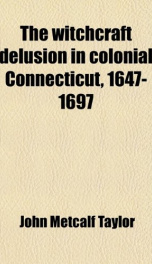The Witchcraft Delusion in Colonial Connecticut (1647-1697)

Purchase of this book includes free trial access to www.million-books.com where you can read more than a million books for free. This is an OCR edition with typos. Excerpt from book: CHAPTER IV "Hence among all the superstitions that have 'stood over' from primeval ages, the belief in witchcraft has been the most deeply rooted and the most tenacious of life. In all times and places until quite lately, among the most advanced communities, the reality of witchcraft has been accepted without question, and scarcely any human belief is supported by so vast a quantity of recorded testimony." "Considering the fact that the exodus of Puritans to New England occurred during the reign of Charles I, while the persecutions for witchcraft were increasing toward a maximum in the mother country, it is rather strange that so few cases occurred in, the New World." New France and New England (pp. 136-144), Fiske. THE forefathers believed in witchcraftentering into compacts with the Deviland in all its diabolical subtleties. They had cogent reasons for their belief in example and experience. They set it down in their codes as a capital offense. They found, as has been shown abundant authority in the Bible and in the English precedents. They anchored their criminal codes as they did their theology in the wide and deep haven of the Old Testament decrees and prophecies and maledictions, and doubted not that "the Scriptures do hold forth a perfect rule for the direction and government of all men in all duties which they are to perform to God and men." Massachusetts, Connecticut, and New Haven, early in their history enacted these capital laws: Jn Massachusetts (1641): "Witchcraft which is fellowship by covenant witha familiar spirit to be punished with death." " Consulters with witches not to be tolerated, but either to be cut off by death or banishment or other suitable punishment." (Abstract New England Laws, 1655.) In Connecticut (1642): " If any man ...
Info about the book
Author:
Series:
Unknown
ISBN:
1434623076
Rating:
4.5/5 (5)Your rating:
0/5
Languge:
English
Users who have this book
Users who want this book
What readers are saying
What do you think? Write your own comment on this book!
write a commentif you like The Witchcraft Delusion in Colonial Connecticut (1647-1697) try:
Other books by this author
Do you want to exchange books? It’s EASY!
Get registered and find other users who want to give their favourite books to good hands!


